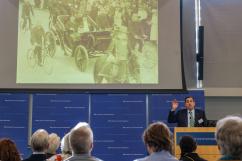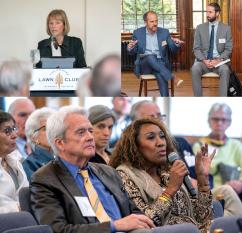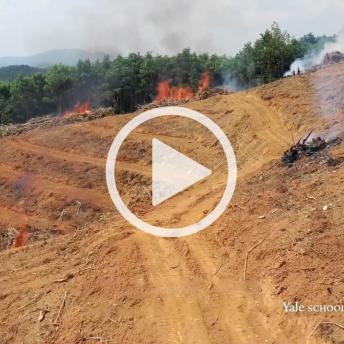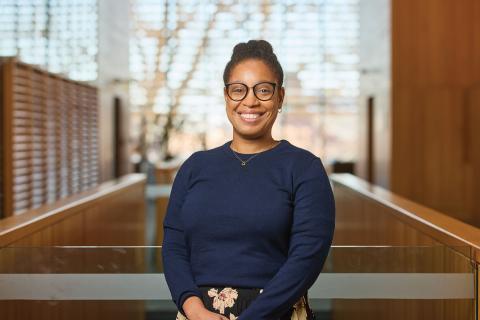
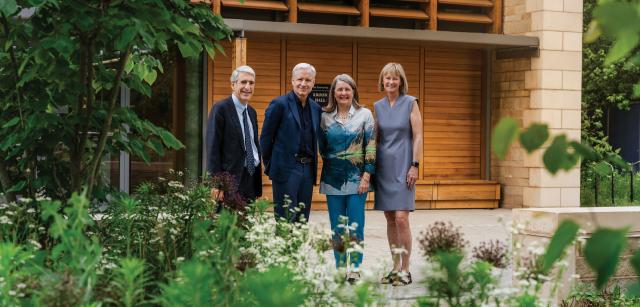
Left to right: Yale President Peter Salovey, Three Cairns Group co-founders Mark Gallogly and Lise Strickler ’82, and Dean Indy Burke. Ian Christmann
An Ambitious New Initiative Supports Emerging Climate Leaders in the Global South
Every country and corner of the world is increasingly affected by climate change. Yet, many low-emitting countries in the Global South are experiencing its worst impacts, including famine, forced migration, and increased burden of disease. In 2022, the Yale School of the Environment partnered with the Three Cairns Group, a mission-driven investment and philanthropic firm co-founded by Lise Strickler ’82 and Mark Gallogly, to launch an ambitious initiative aimed at supporting the next generation of climate leaders in the Global South.
“This program has given us an unprecedented opportunity to impact the climate crisis on a global scale.”
Carl W. Knobloch, Jr. Dean
Supported by a historic gift from the Three Cairns Group, the cornerstone of the program is an enhanced scholarship initiative, the Three Cairns Scholars program, that will allow YSE to meet 100% of the demonstrated tuition need for qualified Global South graduate students committed to advancing climate solutions in their home countries. The first cohort of 20 Three Cairns Scholars will begin in the 2023-24 academic year.
A smaller component of the Three Cairns Climate Program for the Global South, the Three Cairns Fellows program, expands access to two of YSE’s online certificate programs for mid-career environmental professionals — Financing and Deploying Clean Energy (FDCE) and Tropical Forest Landscapes: Conservation, Restoration and Sustainable Use (TFL). In 2022, TFL enrolled 16 participants from the Global South as Three Cairns Fellows, while FDCE enrolled five, and the number will expand in the 2023 cohort. The gift also will support the development of two new online certificate programs with a focus on the Global South — one in urban climate leadership and one in environmental data science for climate solutions.
“We expected that there would be significant interest in the program, but the response from students and environmental professionals across the Global South has been phenomenal,” Dean Indy Burke says. “This program has given us an unprecedented opportunity to impact the climate crisis on a global scale. It also is creating new opportunities for all YSE students as Three Cairns Scholars and Fellows bring new knowledge and fresh perspectives to our school. We are extremely grateful to Lise Strickler and Mark Gallogly for the opportunity to establish this transformative program.”

Disturbance Ecology, Tropical Ecosystems Experts Join Faculty
Sparkle Malone, an expert on disturbance ecology and ecosystem dynamics, and Paulo Brando, an internationally recognized expert in tropical ecosystems, have joined the YSE faculty. Their appointments are supported by an endowment for the Yale Center for Natural Carbon Capture, and both will be members of its scientific leadership team.
Malone’s research focuses on carbon dynamics — the capacity for natural systems to capture and sequester carbon. She teaches courses on methane dynamics and has provided data for the NASA Carbon Monitoring System Blueflux research project, measuring greenhouse gases in Florida’s mangrove ecosystems. In April, Malone was named a 2023 Early Career Fellow by the Ecological Society of America in recognition of her contribution to ecological research, education, communication, and management and policy.
Brando’s research explores the causes of deforestation and forest degradation in the Amazon and the associated consequences to climate and ecological stability, along with the potential future pathways of forests. He uses methods that combine field manipulation experiments, ecological models, and remote sensing.
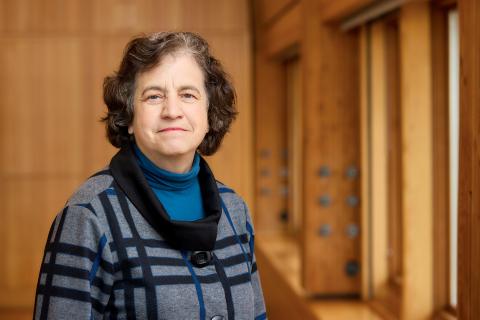
Chertow Honored at Industrial Symbiosis Anniversary
YSE Professor of Industrial Environmental Management Marian Chertow witnessed firsthand how one company’s waste could be reused by another company — a process known as industrial symbiosis — during a visit to Kalundborg, Denmark. Since 1972, companies in an industrial center there, including the city’s power station and oil refinery, have been exchanging waste materials. These industrial exchanges are now happening all over the globe with the help of Chertow’s groundbreaking work identifying clusters of companies across the world that can utilize each other’s waste.
Chertow, who directs YSE’s Center for Industrial Ecology, was honored for her contributions to the field at a conference in Kalundborg in the fall marking the 50th anniversary of the start of industrial symbiosis in the city, which now includes 20 companies.
“This celebration of Kalundborg industrial symbiosis highlights the great potential in cycling physical resources at the local, national, and global levels,” Chertow said during a keynote address.
Building on this track record, Chertow and her students have partnered with the World Bank to develop a global platform featuring industrial symbiosis opportunities.
Restructuring the International Trading System to Support Climate Change Action
“One of the most important developments to emerge from COP27 was the focus on how trade policy and the rules governing global commerce might be used to promote a clean-energy future and advance sustainable development.”
Hillhouse Professor of Environmental Law and Policy
International trade can contribute to climate change mitigation in substantial ways — by spurring innovation, spreading sustainability best practices, and ensuring global access to cutting-edge clean energy technologies at speed and scale. Hillhouse Professor of Environmental Law and Policy Daniel Esty has been working with stakeholders to achieve this goal as part of his public service leave at the World Trade Organization in Geneva this year.
Together with WTO Director-General Ngozi Okonjo-Iweala, Esty is developing a sustainability agenda for a trading system that better aligns the WTO with the world community’s commitment to achieve net-zero greenhouse gas emissions by 2050.
“One of the most important developments to emerge from COP27 was the focus on how trade policy and the rules governing global commerce might be used to promote a clean-energy future and advance sustainable development,” Esty says.
These mechanisms include facilitating trade in environmental goods, decarbonizing supply chains, promoting sustainable food systems, and making countries more resilient to climate shocks.
Natural Capital on the National Stage
Eli Fenichel, Knobloch Family Professor of Natural Resource Economics, was at the center of a historic effort to expand the U.S. economic accounting system to better capture the links between nature and the economy.
In June 2021, Fenichel took leave from YSE to serve as assistant director for natural resource economics and accounting in the White House Office of Science and Technology Policy. There, he led a 27-agency team that produced the National Strategy to Develop Statistics for Environmental-Economic Decisions, a roadmap for a multiyear effort to measure the economic value of natural resources such as land, water, and plants to better reflect the role of natural capital in driving economic growth.
“When we think about the real-world contributions and impact of our work at YSE, it’s hard to imagine a stronger example than Dr. Fenichel’s contributions on this tremendously important effort,” Dean Indy Burke says. “Our natural resources are not infinite and, in some cases, are rapidly depleting; being able to better understand and assess their value is critical in today’s decision-making.”
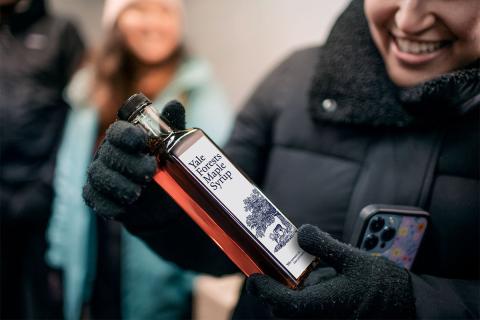
Introducing YSE’s Sustainably Made Maple Syrup
A YSE-led Maple Education and Extension Program run by Yale Forests has yielded more than 100 gallons of syrup for bottling from trees at Yale-Myers Forest. The program, which is in its third year, is led by Director of Forest and Agricultural Operations Joseph Orefice ’09 MF, who is teaching students and New England farmers methods for sustainable sugar production.
The extension program covers sap collection, maple silviculture, syrup processing, and sustainable management of sugarbushes. Students help tap the trees and process the sap into syrup in a demonstration sugarhouse at the forest. The sugarhouse is designed to efficiently concentrate sap into syrup using reverse osmosis technology and a high-efficiency wood evaporator instead of relying on fossil fuel heat sources that are common in the industry.
“Climate change is causing many challenges for maple syrup producers, and the natural resource management and processing systems demonstrated at Yale-Myers Forest are helping sugar producers adapt. Sustainable syrup production is an example of how well-managed forests can provide multiple benefits for people and communities,” Orefice says.
The revenue from maple syrup sales will directly support Yale Forests. (Reserve your 12-bottle case for pickup at Yale)
Leadership Council 2023
YSE’s Leadership Council met on April 20-21, addressing the theme “No Time to Lose: Pulling All the Climate Levers for a Planet in Crisis.” YSE Dean Indy Burke gave a “State of the School” address and Connecticut Green Bank President and CEO Bryan Garcia ’00 MEM was the keynote speaker. In a presentation, Garcia described how Connecticut established the nation’s first green bank that provides a model for other states and countries. Three breakout sessions featured prominent alumni focused on business and entrepreneurship, government, and the non-profit world.
